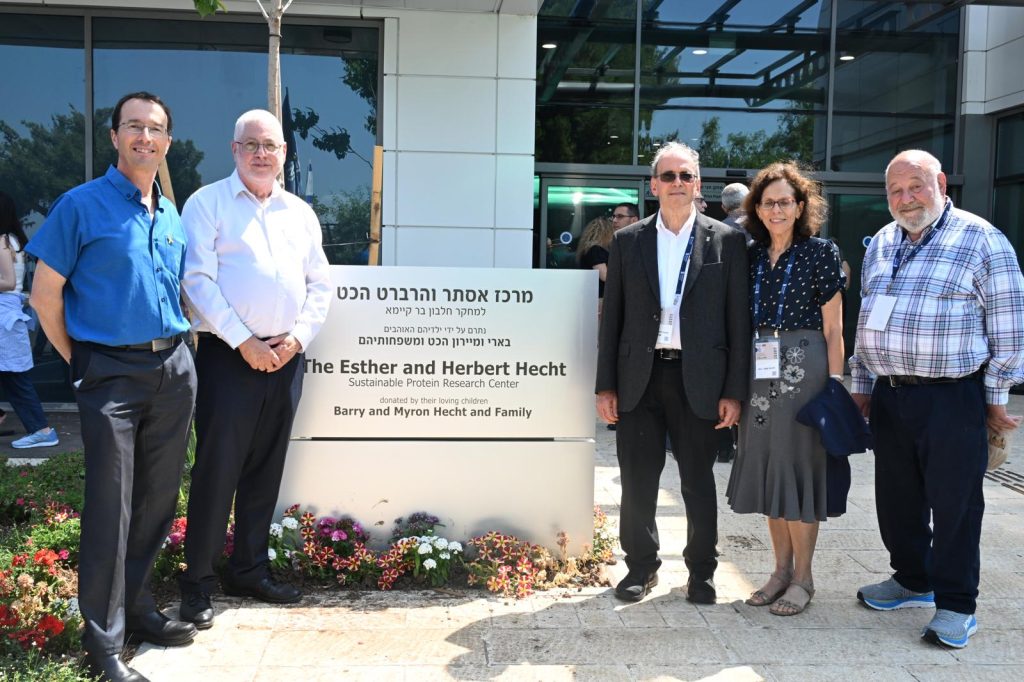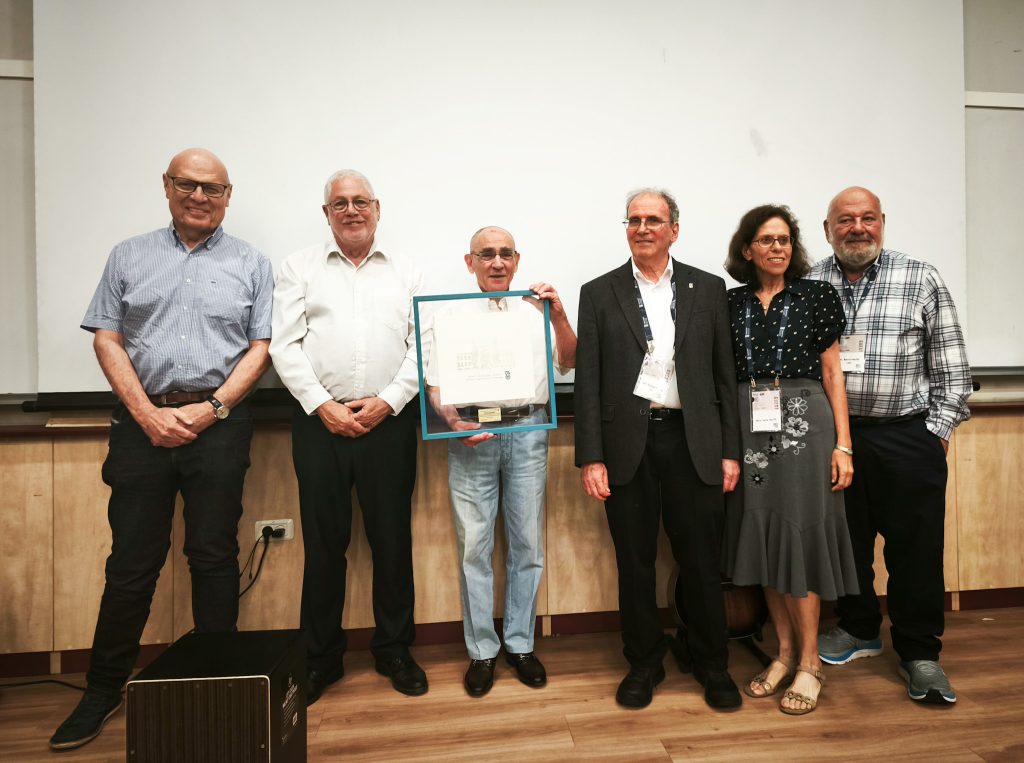Technion Launches Two New Centers for FoodTech and Sustainable Protein Research
The Carasso and Hecht Centers will drive innovation, research, and industry collaboration in food production and biotechnology
Two new centers established at the Technion, the Carasso FoodTech Innovation Center and the Esther and Herbert Hecht Sustainable Protein Research Center, will promote education, research, and innovation in the food sector and strengthen the connection between the Technion and the entire food industry, from traditional to cutting-edge.

Technion President Prof. Uri Sivan stated, “Eliminating hunger and improving food security are among the major challenges facing humanity in the 21st century, as defined by the United Nations’ Sustainable Development Goals. The Technion houses the only faculty in Israel dedicated to food engineering, leading the Israeli food-tech industry. We thank the Carasso and Hecht families for their generous donations, which will help us advance pioneering research in the field, train top scientists and engineers for the Israeli food-tech industry, and maintain our faculty’s position at the global forefront of research and development.”
Dean of the Faculty of Biotechnology and Food Engineering, Prof. Esty Segal, added,
“As dean, I see the establishment of these two centers as a clear manifestation of our vision—to position the Technion and the State of Israel at the global forefront of innovation in food. This field is not only an industrial growth engine—it is a profound scientific, environmental, and social challenge, integrating biotechnology, engineering, health, life sciences, and sustainability. Both centers were born out of a multidisciplinary pursuit of excellence, enabling us to develop breakthrough technologies, bridge basic and applied research, and lead food solutions for a world facing climate change, nutritional inequality, and resource depletion. It is also a commitment to Israel’s future, ensuring food security, advancing sustainability, and training the next generation of visionary, bold, and responsible scientists and engineers. This is a powerful link between science and purpose, between knowledge and impact—for Israel and the entire world.”
Prof. Emeritus Peretz Lavie, chairman of the Technion Friends Association in Israel, said, “The new center will support the Technion and the faculty in their mission—to bridge science, engineering, and technology in shaping the future of food production, preservation, and consumption, while advancing key goals such as waste reduction and environmental protection. We face major research challenges that intertwine health, sustainability, and innovation, alongside the educational task of training the next generation of scientists and engineers. This center will allow Technion researchers to translate ideas into real-world impact. We thank the Carasso family across generations, including the younger generation, for enabling the establishment of this important center. Let us celebrate this milestone—and now, to work.”

The Carasso FoodTech Innovation Center was established thanks to the generous support of the Freesbe Carasso Motors company, its CEO, Itzik Weitz, members of the Carasso family, and the Together Foundation. Carasso Motors, Israel’s oldest car importer, was founded in 1933 by Moshe Carasso, who immigrated from Thessaloniki in 1924 with his wife Palomba and their four children—the same year the Technion opened. Today, under the Freesbe brand, it is Israel’s largest and most diverse automotive company.
The third and fourth generations of the family continue the business legacy of Moshe Carasso while also engaging in social activities focused on reducing inequality, promoting academic excellence, and developing Israel’s advanced industry. Their connection with the Technion—a premier academic institution grounded in excellence and values—is natural for the family and the company, and this donation continues a tradition of previous Technion contributions. Applied research in food technologies enhances Israel’s resilience and food security, drives economic growth engines, and enables regional and global collaborations. All this addresses broad sustainability challenges facing the world today.
The Carasso family’s contribution, which will strengthen Israel’s footprint in global food research, is intended to support and realize their values and those of their company, emphasizing Zionism, excellence in science education, reducing disparities, and investing in infrastructure. The upgraded, expanded facility will be unique in Israel and among the most advanced in the world. It will include a research and development center for industrial-scale production, equipment for scaling lab processes to pilot scale, laboratories for food and biomaterials analysis, a fermentation lab, an industrial kitchen, and a tasting room—all designed to support teaching, research, and collaboration with industry and startups.
The Esther and Herbert Hecht Sustainable Protein Research Center is a multidisciplinary center that brings together approximately 50 researchers from various Technion faculties to develop food solutions for a better future. The center will serve as a model for sustainable protein research, promote collaborations within and beyond the Technion, and foster innovation, entrepreneurship, and the training of professionals in this field.

Prof. Yoav Livney, faculty member at the Faculty of Biotechnology and Food Engineering and head of the Esther and Herbert Hecht Center for Sustainable Protein Research, said: “The center is the world’s first academic center in this field. Its vision is to serve as a multidisciplinary hub for researching and developing sustainable sources of protein. Its activities are grounded in Technion excellence and the rapid global development of this field. The center promotes research, attracts outstanding new researchers, trains graduate and postdoctoral students, and provides cutting-edge research infrastructure. It offers competitive research grants to launch initial interdisciplinary projects and holds conferences to strengthen connections between relevant researchers at the Technion and beyond.”
The Sustainable Protein Research Center bears the name of Herbert and Esther Hecht, whose estate funded the largest of several donations to establish the center and supports its important work.
Herbert Hecht (1922–2020) was born in Frankfurt, Germany and came as a refugee to the United States from the Nazis in 1939. He began his life in New York working to support himself and his parents while studying electrical engineering. He served in the U.S. Army, and upon his discharge, began his professional career, eventually distinguishing himself as a world leader in computer hardware and software reliability. His connection with the Technion spans decades and even included a term teaching in the Faculty of Data and Decision Sciences (formerly the Faculty of Industrial Engineering and Management at the Technion).
Esther Hecht (1925–2023) was born in Moscow, Russia, but grew up in Tel Aviv. When her father died, her family suffered economically and immigrated to New York during World War II, where she met and married Herbert. She pursued degrees in social work and worked as a clinical social worker while raising a family. Among her achievements was bringing three generations of her family from the former Soviet Union to Los Angeles.
The Hechts’ extraordinary lives were marked by their vigorous dedication to Zionism, their enduring belief in the importance of family, and their personal ethic of hard work and perseverance. Their sons, Barry Hecht and Myron Hecht, were proud witnesses to the dedication of the center.



